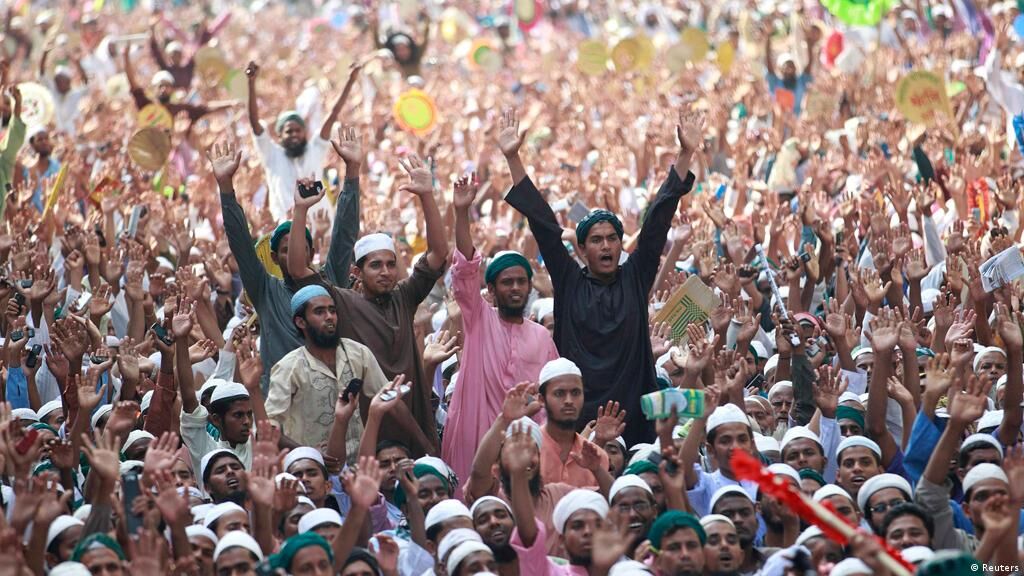A worrisome upswing
In the warm up to Bangladesh elections, certain extremist groups are gaining ground — perhaps with hidden support from Pakistan

Bangladesh's polity had remained highly politicised even during the days of East Bengal and East Pakistan. In fact, leaders like AK Fazlul Huq and HS Suharwardy had always been extra active in Bengal politics, outwitting the Urdu-speaking politicians during the run-up to the Partition of the Indian subcontinent. Bangla politicians, including the youth, have always been at the forefront in their struggle for rights. The language movement of 1952 and liberation struggle of Bangladesh in 1970-1971 are still fresh in memories. Also, the country, within 20 years of its independence, overthrew the corrupt Ershadi regime in 1991 when, cutting across political ideology, the parties closed their ranks and filed for his ouster. Such political activities still live on.
Now, the next general election in Bangladesh is scheduled in about one year's time and election frenzy seems visible on the political horizon of India's Eastern neighbor. Among the noticeable activities is an increase in the criticism of the Sheikh Hasina-led government by the opposition parties — principally the Bangladesh Nationalist Party (BNP) which has stepped up its anti-government tirade through some aggressive rhetoric. BNP's Secretary General Mirza Fakhrul Islam has come to notice, castigating the Awami League (AL) in a very belligerent manner. He, in particular, has started criticising the alleged stifling of the Bangladeshi media, false police encounters and mysterious disappearances of several individuals, deteriorating economic conditions, rising inflation and blatant abuse of human rights. Such berating is likely to intensify as the election dates approach close.
Meanwhile, the incumbent government is taking all measures to ensure that the sanctions imposed by the US administration on a number of police, paramilitary and security outfits of Bangladesh are lifted. This was discussed in this daily's last week's column about the use of Indian diaspora settled in the US to bail Bangladesh out of this imbroglio. In addition to such attempts, to ensure that there is no let-up in removing the sanctions, the ruling party has dispatched a four-member delegation of the AL MPs to the US. This significant delegation includes Chairperson of the Parliamentary Committee attached to the Bangladesh Foreign Ministry and member of the party presidium, Lt Col (Retd.) Mohd. Farukh Khan, Nurul Islam Nahid, Nayeem Razzak and Kazi Navil Ahmed. The delegation is expected to meet, during their stay, a number of organisations and host government officials to refurbish the tarnishing image of Bangladesh in the West, especially in the US. It also aims to discuss ways of mutual cooperation towards development of several projects in Bangladesh.
However, the election heat in Bangladesh is being fully appropriated by no other than the most fundamentalist Islamic outfit Hefazat-e-Islam. This looks worrisome as its top leadership has decided to reconstitute its structure in view of the forthcoming elections. And to reach the grassroots level, the Hefazat has concrete plans to revamp its structure in the entire country at the Union, Thana and District levels. Simultaneously, a five-member subcommittee has been constituted to devise vote-catching methods. More importantly, the Hefazat-e-Islam has set up a platform to convert Islamic laws into reality. This apart, Hefazat, which is reliant upon thousands of Madarasa students to mobilise their alumni of the Quami Madarasa students, is set to play a crucial role in the next Parliamentary elections.
It may be recalled that on June 7, 2021, Hefazat-e-Islam had constituted a 33-member Central Committee, and in this year, on March 23, held a meeting of critical importance in Fatikchari, Chittagong, under the chairmanship of its Amir, Muhimullah Babunagri.
It called for release of all the prisoners belonging to Hefazat-e-Islam and claimed having extracted an assurance from the Home Minister of Bangladesh. It would appear from these developments that Hefazat-e-Islam, earlier believed to be close to AL, possibly to counter weigh the vicious Jamaat e Islami (JeI), is gearing up for the elections to have an electoral space in Bangladesh politics. However, the critical question arises as to who is guiding Hefazat-e-Islam? Who is funding this outfit, especially in its restructuring? Answers also need to be found on the lurking suspicion that training and arms are being supplied clandestinely to Hefazat. Who is behind such nefarious activities?
It would be important not to outrightly ignore apprehensions that Pakistan High Commission in Dhaka may be engaged in a negative role in helping the Hefazat with an agenda and logistics engineered possibly by the ISI to inject Jehadi mindset to neutralise the moderates and liberals in the Bangladesh polity, and also the civil societies that have always been trying to marginalize the Islamic radicals and provide protection to the minorities. It also needs to be borne in mind that Hefazat was directly complicit in the communal clashes which saw attacks on the Hindus, their places of worship and wanton destruction of minority property. They need to be held accountable. Bangladeshi security establishment and politicians at the helm need to remain alert against the religious extremist forces, particularly in view of the election tempo which will gather momentum earlier than the distant future.
The writer is a retired IPS officer, a security analyst and a former National Security Advisor to the PM of Mauritius. Views expressed are personal



